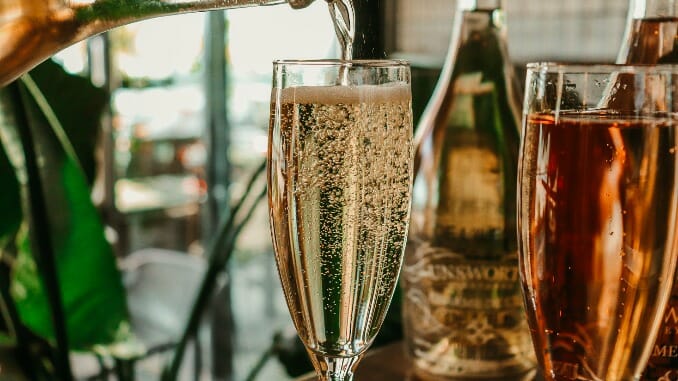Sparkling wine: The alcoholic hallmark of any celebration. It’s the bottle you bust out for birthdays, anniversaries and graduations, and when you pop the cork, everyone knows the party is about to get more exciting.
But after two years of living in a pandemic, rekindled fears about nuclear disaster in the face of a new war in Europe taking hold and the inevitability of large-scale climate crisis that threatens to upend life as we know it, some drinkers have seemingly started to question the wisdom of waiting for a big life event to take place before popping open a bottle of bubbly. In a time when it sometimes feels like we have little to look forward to, some are embracing pleasure in the moment by breaking out the bubbles on random Tuesday nights, chill Friday night get-togethers and even the occasional weekend morning.
If you’ve noticed this new trend taking hold, you’re not alone. Markets were already seeing an increase in sparkling wine consumption before the pandemic, but numbers really jumped during 2020 and 2021. Now, experts expect 3.4% growth in the segment by 2027.
Wine industry professionals are certainly noticing the shift. Philana Bouvier, President of Demeine Estates, says, “The pandemic really created a mindset where you live for today, and you celebrate with people now, and you’re celebrating at home, so champagne and sparkling wine became something that people just wanted to drink all the time.”
Interestingly enough, it doesn’t seem like all wine drinkers are driving this growth in the sparkling wine market. Consumers over the age of 55 are less likely to buy sparkling wines, perhaps because they have been less likely to attend celebrations during the course of the pandemic. Instead, it’s those under the age of 45, generally affluent and living in urban areas, who are to thank for the boom. These drinkers may not always have the money to invest in expensive wine collections or cellars, but they are willing to shell out some extra cash to enjoy a beautiful bottle of bubbly in the moment.
Although Champagne may first come to mind for most people when they think about sparkling wine, that’s not necessarily always the first choice for many wine drinkers, especially those who don’t want to drop serious cash for a weeknight bottle. Because of the production method used to make Champagne, it is more costly to produce, and that cost is passed onto consumers. As inflation grips the economy and supply chain issues abound, Champagne prices will continue to rise.
Instead, plenty of sparkling wine lovers are turning instead to less-expensive alternatives like Prosecco, an Italian sparkling wine, or Cava, a Spanish sparkler that’s actually made with the same method as Champagne. Bouvier says these alternatives will likely gain popularity as the sparkling wine sector continues to grow.
Even beyond the more conventional sparkling options, pét-nat, a kind of sparkling natural wine, continues to appeal to younger, often more environmentally conscious wine consumers. Pét-nats are fermented in the bottle and generally require less intervention than, say, Champagne or Cava. Some pét-nats and natural wine producers have a cult-like following, although their audiences may be relatively niche.
But regardless of which sparkling wines individual consumers prefer, the idea of delayed gratification, of waiting for a “good” reason to open a bottle of bubbly, has somewhat fallen by the wayside. It’s likely that sparkling wine will still be consumed at celebrations, but that doesn’t mean it has to be limited to these kinds of events. After all, in such uncertain times, there’s no telling if we’ll be able to gather for the next birthday, the next holiday, the next graduation. It makes more sense to celebrate while we can.
The rise of sparkling wine’s popularity and an effort to enjoy the “now” seems to be echoed across the culture, specifically with Gen Z and younger millennials, who are wondering whether working hard for a company and chasing a career, once the poster children of delayed gratification, are even worth the effort. They’ve seen their elder millennial counterparts struggle to gain a foothold in the corporate world while still suffering under the weight of student loans and being largely priced out of the housing market. Why participate in a system and adhere to traditions that seem to yield no real benefit to normal people? This mindset can be seen across cultures, from young North Americans giving up a conventional apartment and lifestyle in the city to participate in “van life” to Chinese millennials giving up their day jobs and joining the “lie flat” movement.
It’s yet unclear whether this kind of thinking is helpful, but it is understandable. When that same mentality is applied to drinking wine, though, I have to think it’s a good thing. Life is short. Why wait to celebrate?
